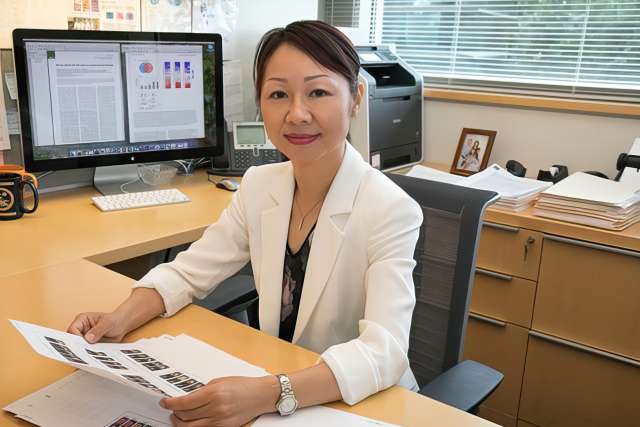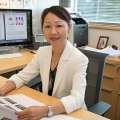Dr. Lili Yang, a prominent cancer researcher at UCLA’s Jonsson Comprehensive Cancer Center (JCCC), received a Basic Biology V grant totaling approximately $641,400 from the California Institute for Regenerative Medicine (CIRM), the state stem cell agency, recognizing her leading-edge, innovative research.
Yang, JCCC and UCLA Broad Stem Cell Research Center (BSCRC) member, and assistant professor of microbiology, immunology and molecular genetics, was among five UCLA researchers to receive one of the CIRM awards, for her project to develop a novel system for studying how stem cells become rare immune cells.
The award was part of CIRM’s Basic Biology V grant program, carrying on the initiative to foster cutting-edge research on significant unresolved issues in human stem cell biology. The emphasis of this research is on unravelling the secrets of key mechanisms that determine how stem cells, which can become any cell in the body, differentiate, or decide which cell they become. By learning how these mechanisms work, scientists can then create therapies that drive the stem cells to regenerate or replace damaged or diseased tissue.
“These basic biology grants form the foundation of the revolutionary advances we are seeing in stem cell science,” said Dr. Owen Witte, professor and director of the BSCRC. “Every cellular therapy that reaches patients must begin in the laboratory with ideas and experiments that will lead us to revolutionize medicine and ultimately improve human life. That makes these awards invaluable to our research effort.”
Using a New Method to Track Special Immune Cells
All the different cells that make up the blood come from hematopoietic or blood stem cells. These include special white blood cells called T cells, which serve as the foot soldiers of the immune system, attacking bacteria, viruses and other invaders that cause diseases.
Among the T cells is a smaller group of cells called invariant natural killer T (iNKT) cells, which have a remarkable capacity to mount immediate and powerful responses to disease when activated, a small special forces unit among the foot soldiers, and are believed to be important to immune system regulation of infections, allergies, cancer and autoimmune diseases (such as Type I diabetes and multiple sclerosis).
The iNKT cells develop in small numbers in the blood, usually less than one percent of all the blood cells, and can differ greatly in numbers between individuals. Very little is known about how the blood stem cells produce iNKT cells.
Yang’s project will develop a novel model system to genetically program human blood stem cells to become iNKT cells. She and her colleagues will track the differentiation of human blood stem cells into iNKT cells providing a pathway to answer many critical questions about iNKT cell development.
With this knowledge, therapies can be created that increase the number of iNKT cells in the blood, creating more special forces cells and increasing the body’s ability to fight off the diseases these cells affect.
CIRM was established in November 2004 by the passage of Proposition 71, the California Stem Cell Research and Cures Act, a ballot measure that provided $3 billion in funding for stem cell research at California universities and research institutions. The bill received overwhelming approval from voters and called for establishment of an entity to make grants and provide loans for stem cell research and facilities.




